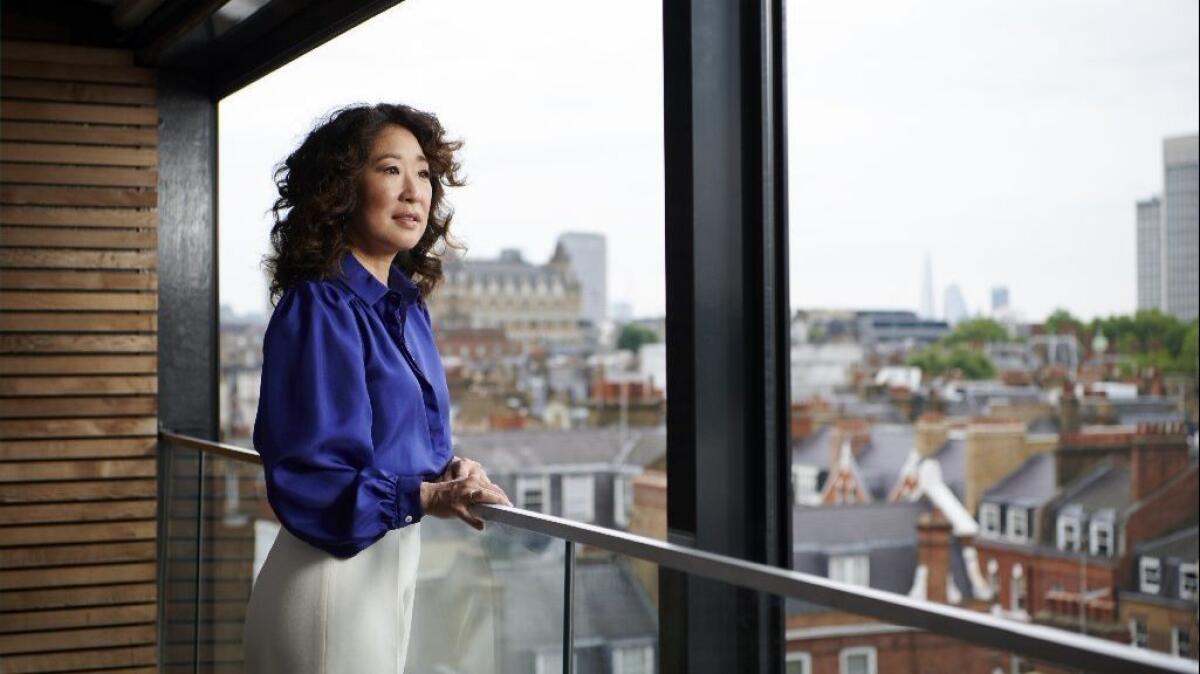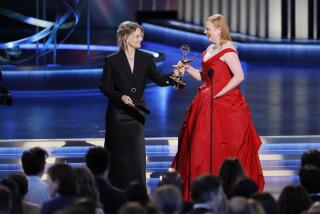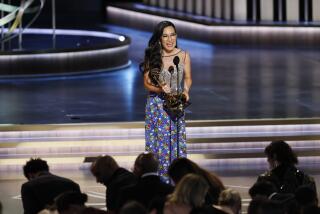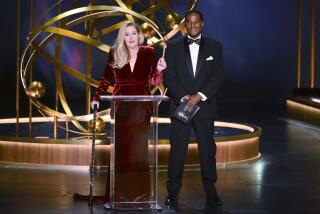Sandra Oh on making Emmy history, ‘Killing Eve’ and the joy and grief in feeling recognized

Playing an ambitious MI5 officer obsessed with the murderer she’s tracking, Sandra Oh — born in Canada to Korean immigrant parents — recently made history, becoming the first woman of Asian descent to earn an Emmy nomination for lead actress in a drama series for her work on “Killing Eve.”
Calling from London where she’s filming the second season of the BBC America series, Oh says she can still feel the impact of the nomination — not for herself, but for the Asian community. “I just absolutely always, always feel the community,” she says.
Oh, 47, is no stranger to the Emmys, having been nominated five times for her supporting role as Dr. Cristina Yang on “Grey’s Anatomy.”
But her portrayal of Eve — a complicated woman who’s caustic, witty, intense and imperfect — represents a new chapter in Oh’s career and life, one that she was eager to discuss.
“This woman demands all of me,” she says. “And I wouldn’t want it any other way.”
You spent months shooting “Eve” in London, and then you come back home to L.A. and finally it airs. When did you know people were connecting with it?
I felt it in my day-to-day life. And what I mean by that is, I’m doing my walk around the reservoir and locals are just jogging around, and when I’m stopped, someone will say, “Hey, I really like your new show!”
My absolute favorite L.A. moment about “Killing Eve” was the following: I’m getting my work visa, and I’m down right near Crenshaw, like east of Crenshaw, right? I have a little bit of time so I go into a beauty shop because you just want to go into a beauty shop there and see what all the ladies are doing.
So I just go into this beauty shop that was owned by an Asian woman. I don’t know if she was Korean. I kind of don’t think she was Korean, but she was an Asian woman in her 50s and her clients are all primarily African American women. So I’m just looking at the hairpieces, and the beauty shop owner comes up to me and goes, “Are you that lady on ‘Killing Eve’?” And these were the early days [of the show]. The early days! I cannot believe this is happening! And I go, “Yes, madam. I am.”
And then she goes to her clientele, these African American women, and says, “Oh, I am watching this show! You have got to watch this show, ‘Killing Eve.’” So we’re outside of the Hollywood bubble, outside the Westside bubble in this beauty salon in Crenshaw. It was the most amazing L.A. moment ever! And that’s when I really started feeling it move in a way that spoke to connection.
Since we’re on the subject of L.A. moments, let me ask you about another one. I need to know everything about that photo you posted on Instagram of your parents in front of a “Killing Eve” billboard. They’re dressed so beautifully!
That was taken after church because, I don’t know if you know any Koreans — I bet you do — but we love church and we like to golf. They were visiting from Vancouver, and after church, my parents were like, “Take us to a billboard. We want to see a billboard.” So I’m driving around West Hollywood thinking, “I know there’s a billboard around here somewhere.” And I found it, and they were thrilled to see it. And I’ve got to tell you, I’m grateful people do respond to that particular photo.
So you’re saying your parents didn’t dress up for the billboard?
They got dressed up for God.
Do you still go to church?
I go to church whenever they’re here because I grew up that way. I grew up in so much church, English-speaking church, Korean church. But, no, I practice Buddhism, which is really, ultimately, generations before where my parents come from.
You spoke of the reaction to that picture. What about the response to your Emmy nomination? It was a mixture of joy and disbelief that it took so long. Did you feel that?
I could feel it two ways. I could feel it in the response of my friend Michelle who is Asian and was there with me in my flat in London. I saw it on her face. And I could feel it in the questions I got afterward. I don’t spend too much time on social media, so I can protect my mind space. But I could feel it in the engagement from people like yourself who were telling me this was happening.
It’s funny. I would have been alone, receiving the news, but because Michelle was with me, I had this personal experience with someone I’ve known for a while who is in the trenches as well. That meant a lot to me. So it was a very, very personal experience and also memorable in the way it reverberated out to the community as a whole. I just absolutely, always, always feel the community.
And how did you feel the community on that Emmy nominations day?
It felt like this place where my community is really waiting to see themselves. And I can just see that in people’s faces. There’s joy and grief in there.
It seems like an annual rite of passage lately at the Emmys. Viola Davis becomes the first African American to win lead actress drama. Donald Glover is the first African American to win for directing a comedy. People want to celebrate these victories but at the same time, it’s, like, wow. What took so long?
This is the time to open our arms to the understanding of each other’s grief. And, again, I don’t feel like it has anything to do with me. It has to do with the joy of seeing themselves recognized, you know? And then sometimes there can be the grief of: “I need to feel recognized.”
It reminds me of you talking about your experience watching “The Joy Luck Club” as a young woman. You had this intense reaction that was almost, somehow, too extreme.
Yes! Absolutely! I remember this really, really well. I like talking about it now because that was a long time ago, man. Like over 20 years ago. And it’s just stayed with me. And I’ve thought about my reaction. And I’ve thought about how long it’s taken me to see another movie like that.
Speaking to your point, when I watched that movie, my reaction was way more than what the film was calling for. Just the bare bones of the film and the storytelling itself, my reaction was so profoundly emotional. That’s the grief part I’m talking about. And it’s taken me a really long time to figure out that I was weeping so uncontrollably — like racking sobs — because as I was watching the story about mothers and daughters, I realized this was the first time I saw my mother on screen.
And I’m realizing that all the storytelling I’d seen before — Lucille Ball, Meryl Streep, I’m talking about a fantastic variety of storytellers who have been the representation of women — I felt like I was with them, but there was a well that was missing. There was just a well that was way deeper for me that I had never accessed until I saw “Joy Luck Club.” And there’s a tremendous amount of grief with that.
I don’t think we’ve really touched the surface of what it does to the psyche of a people if the only image of you out there is negative.
— Sandra Oh
A lot of people take that representation for granted.
I’d be so fascinated to talk to a psychologist or sociologist about the deep, psychological impact of seeing oneself represented. I don’t think we’ve really touched the surface of what it does to the psyche of a people if the only image of you out there is negative. Or if it’s never out there. There is a certain type of invisibility that I think lives in the Asian American community. It’s very difficult to measure the impact of that. There’s no numbers to say how it affects a 5-year-old Thai girl who grows up in Kansas City and never sees herself. And to only have dolls that are white. There are no numbers to actually tell you that that affects the psyche of a person deeply. Because I see it in people’s faces. I feel it.
Who did you see on screen as a young woman?
Connie Chung. I remember everyone in high school thought I should be a journalist because I looked like Connie Chung.
Oh my God …
Not only that, I [kid] you not, when I started acting, all I got was journalists. And the reason why, when you take a look at it, is: “The only way I understand a face that looks like you right now is to the able to put it to what I’ve known before.” And growing up in the ’80s, Connie Chung was an extremely visible force. So that was the only way people could see me.
You mentioned Viola earlier. Oh, my God, Viola. Who did I see as a young woman? I would absolutely put Viola right there.
When did you first find her?
On stage at the Public [Theater] in “Pericles.” She played a nurse and I was just like, “Who the hell is that? Who is that?” And following her career to now, she so embodies what I strive to be. Same with Angela Bassett. That’s who I went toward in how I see myself. I absolutely saw myself in the African American community. I felt more aligned there. I’m constantly searching for that alignment.
What in Viola embodied what you strove to be?
Life. [Laughs]
Go on …
Viola’s movie scenes are burned in my mind. And there were movies when she had only one scene. Like “Traffic.” She’s doing the intake for Michael Douglas’ daughter and she’s running through the questions, not looking up, because you wouldn’t look up, and then, finally, she looks up at the girl and asks, “Why are you here?” That’s the scene! And her work is so good!
And the times when there are not broad opportunities for actors of color, when I’ve been heartbroken or frustrated or a ton of feelings, I looked to Viola and thought, “I just want to be as good as she is in a scene. If Viola can do it, I can do it. What can I do with one scene? I want to try to be like Viola.” That’s what it is.
That’s a lot. I guess we should talk more about “Killing Eve” …
I know, right?
That last episode. That last scene. Eve and Villanelle on the bed. They’re together, but they know they can’t really connect. Where do you go from there?
You know, by the time we got to that scene, we were running on fumes. And we had no idea what we had. We were just creating. And when Eve surprises Villanelle and just lies down and says, “I’m tired.” [“Killing Eve” creator] Phoebe [Waller-Bridge], at that point, was just writing to where we all were. And I cannot tell you how tired I was. Just so bone-tired.
And then the stabbing happens and there’s this flurry of energy and Villanelle escapes. I will say, that kind of energy, that’s what we’re trying to bring to the very top of this season.
That last scene? A lot of people think everything is planned out. And that’s just not the way it is. [Laughs] There’s a lot more bananas and a lot more magic and a lot more stress when you’re in the midst of creating something. That last scene? I really do think it worked. But I can’t believe it worked. You have no idea.
It’s crazy how Villanelle, this psychopathic assassin, was the person who helped Eve fulfill her potential.
Mmmm-hmmm. She did. I’m eager to go deeper into the psychology between these two women and how they affect each other. That’s a very rich area. It’s an impossible romance.
You turned down a lot of things after you left “Grey’s.” Were you getting the kinds of offers you expected?
That came from a place of being able to exercise choice, which I’m aware not everyone is able to do. And I wanted to take this time in my life and see what that was. I remember, 15 years ago, this dear friend of mine, he’s married to this fantastic, wonderful Spanish actress, and we’re on the beach and I was just talking to her about work and she said, “I only do things that move me.” In a very Spanish way.
And I just thought, “Oh, my God! What the hell is that? You only do work that moves you as opposed to work that pays the bills or work that you need to have a gig?” And I just think I kept that in my back pocket to say, “I would love to get to that point in my life where I only do work that moves me.” And I will say that after “Grey’s,” I did hold that bar quite high.
And then when “Eve” came, this role that lets you do everything, you were there, ready for it.
Correct. But also, I feel like I know so much more now in my mid-life. I’m in my 40s. You know when you move to that part of your life where you ask: “Why am I hanging out with these people I don’t really care about?” It’s the same thing. I only want to do things that demand all of me. That’s just how I want to give. I want to give all of me. So I need to find something that is worth it. And “Eve” is worth it.
More to Read
From the Oscars to the Emmys.
Get the Envelope newsletter for exclusive awards season coverage, behind-the-scenes stories from the Envelope podcast and columnist Glenn Whipp’s must-read analysis.
You may occasionally receive promotional content from the Los Angeles Times.







